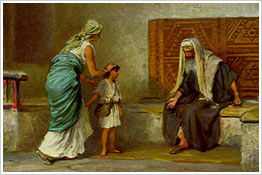Lessons from a Little Boy
Reading the story of Samuel together, families can share in the adventure as well as gain helpful insight to values and character traits from which all of us can learn.
By Caryl W. Krueger
Categories: Family, Hannah and Samuel Most youngsters like stories about other children - their adventures, their challenges - even their fun. Your Bible is a wonderful resource for regular family story telling. And, a plus is that along the way the Bible provides subtle avenues for making some helpful points based on the story.
 Consider the story of Samuel. He is a much-wanted child, but his life becomes dangerous; he has a wonderful problem-solving connection, and then becomes a very famous person. Here is how you might go about using this story, little by little, over several nights of story-telling. Consider the story of Samuel. He is a much-wanted child, but his life becomes dangerous; he has a wonderful problem-solving connection, and then becomes a very famous person. Here is how you might go about using this story, little by little, over several nights of story-telling.
Day 1. Tell how Hannah and her husband were good God-loving people but they had no children. This is what happened at the temple one year. Read I Samuel 1: 8- 11, 17. Questions: At the temple, who did Hannah tell about her problem? (This is the first record in the Bible of a woman praying.) What did she promise? What was the holy man's answer? What does a promise mean? Do you keep promises? What can you pray about? Do you expect results from prayer?
Day 2. Read what happens next. I Samuel 1: 20, 24-28 and 2: 1 1 starting with "And the child...," also verses 12 and 18. Questions: Did Hannah and her husband Elkanah keep their promise? How old was Samuel when he went to live in the temple? Other than the priest, who else was there? Were these good sons? What could Samuel do to protect himself? How do you protect yourself from people who have bad plans for you?
Day 3. Read I Samuel 2: 19, 20, 26. Questions: How could the outfits Hannah made for him be the right size? How do parents nowadays know what their children need? What was the reward for Hannah and Elkanah because they had kept their promise? How did Samuel get along at the temple? What can you do to succeed when you are away from your parents?
Day 4. Read I Samuel 3: 1-11, 19. Did Samuel immediately understand who was calling him? When did he know it was God? Was the priest Eli surprised? What did God tell him would be the result of this calling? Do you listen to God? Do you always respond to God's angel messages? What does it mean that "he did let none of his words fall to the ground?"
After these story-telling times, you may wish to read the rest of Samuel's story and his fame as a judge, his defeat of an enemy, and his eventual leadership. This type of story-telling-learning is not only fun, but it enhances your youngster's understanding of the Bible and its characters and history.
It also teaches grand lessons that can be used in years to come. Certainly this teaching is an example of the Beatitude in Matthew 5:8 - "Blessed are the pure in heart: for they shall see God." |